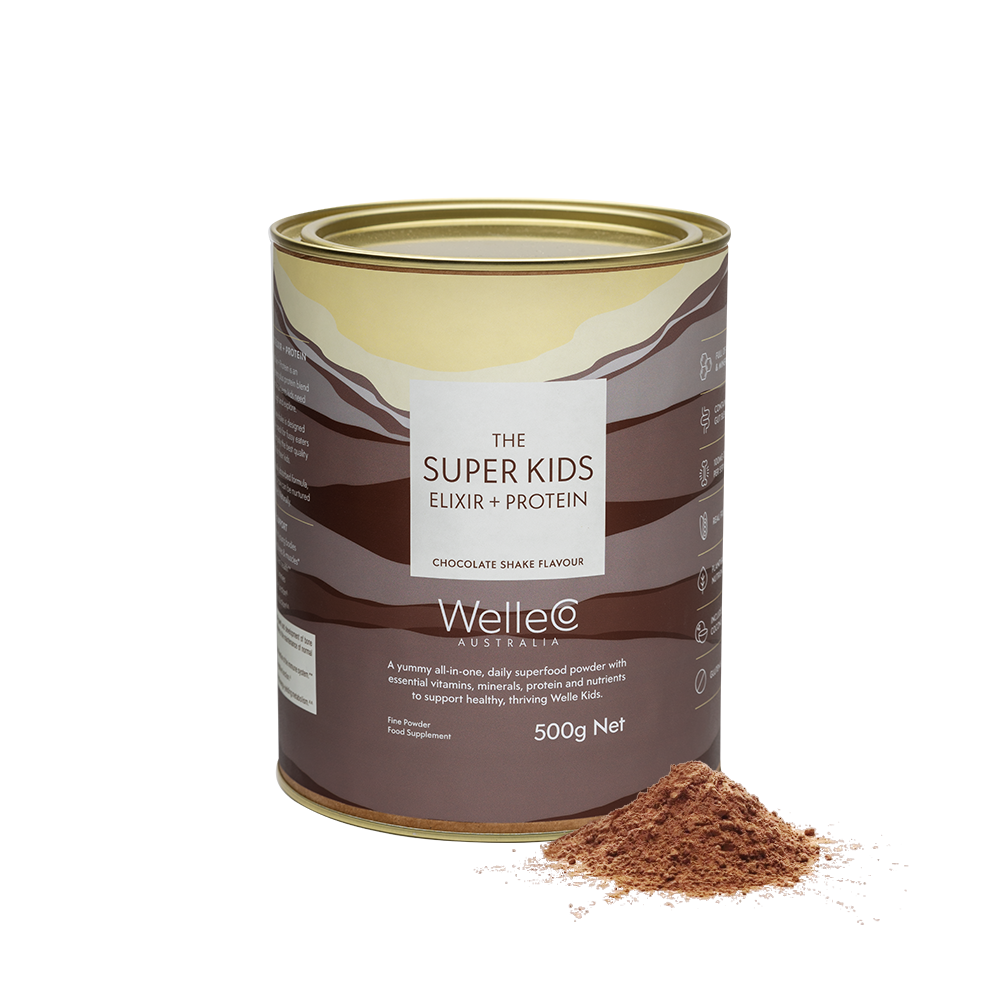A Nutritionist's Tips On Childhood Nutrition
Get your fix of wellness and things that inspire us.
Now growing Welle is kids play
To support the launch of WelleCo’s The Super Kids Elixir + Protein – a daily superfood powder packed-full with essential vitamins, minerals, protein and nutrients to support healthy, thriving kids – Dr Simoné Laubscher, one of the world’s leading nutritionists and formulator of the new product, shares her top tips on how to keep your child strong.
1. Choose Whole Foods for Child Nutrition
As a simple rule, if it looks like it did in nature by the time it reaches your plate, then it’s a whole food and it hasn’t been overly processed. Whole foods are less likely to contain added chemicals; simply put, man has had less influence over these foods.
Choose organic where you can to avoid pesticides and added hormones to reduce toxic load. Eating foods in their natural state is a great start to ensure maximum nutritional value. Even buying fruits and vegetables that have not been pre-packed and already cut up and put into plastic is vital; once cut, the food will oxidise/deteriorate, and absorb the chemicals in the plastic packaging too. On this note, avoid any meals served hot in plastic containers, for the heat of the food brings out the harmful chemicals in the plastic, which then goes into your food.
Make this journey fun and get your kids involved so that you can research healthy recipes on weekends and try different ideas. Healthy child nutrition is a much healthier approach than putting kids on a ‘healthy diet’, which is pretty dull all around and can create a poor relationship with food.
2. Boost Essential Fats
Not all fats are created equal, and essential fatty acids (EFA’s) are imperative for your child’s brain health, memory or cognition to regulate mood, heart health, hair, skin and nails and everything in between. There are many ways to do this depending on your child and, if exams are on their way, now is the time to load on Omega 3. Add half a tablespoon of coconut, avocado, cod liver oil, extra virgin olive oil or any nut oil (if no allergies) to lunch and dinner, and add oily fish, avocado and olives to their diet at least three times a week.
It’s also essential to avoid the toxic trans fats frequently found in processed and fried foods to support healthy child nutrition. This unhealthy type of fat can contribute to serious conditions like heart disease, cancer, diabetes and obesity. Trans fats usually come from vegetable oils such as sunflower, palm and corn oil, and regular margarine. It is also crucial to only cook with these oils that don’t turn rancid, such as avocado, coconut, regular light olive oil (not extra virgin; this is best left cold for salads) or nut oils.
3. Balance their Blood Sugar Levels
Choose a good quality protein at each meal: nuts seeds, hummus, wild fish, organic eggs, organic chicken and meat, organic nut butter or organic kefir or plant milk. Stay away from refined sugar and choose carbohydrates with a low-moderate GI rating opting for more vegetable, fruit and whole grains such as brown rice.
Instead of using sugar, use stevia, coconut sugar, monk fruit sugar or Manuka honey in moderation. By cutting the sugar, you support your gut microbiome too: this will kill the candida and when you clear out the candida and fungus, you will in turn reduce cravings, inflammation & excessive body fat. Many children also have candida and fungus – a significant initial way to check is to see if your child has a white coat on their tongue.
There’s also great benefits to be had from supplementing your children’s diets with a powerful product such as WelleCo’s The Super Kids Elixir + Protein. This is a simple and effective way of introducing the essential vitamins, minerals, protein and nutrients that children need to grow, with a formula that is vegan and easily absorbed, and which is delicious enough for even the fussiest of eaters to enjoy. It’s a great snack alternative between meals and helps to establish the building blocks of good nutrition in later life.
4. Hydrate
Hydration is an essential component of balanced child nutrition. Staying hydrated is vital for many aspects of health, and drinking enough water regulates everything from cell function to body temperature, digestive function and cognition/mood. According to the Academy of Nutrition and Dietetics, water requirements can vary but typically range from 7–12 cups per day, depending on the age and sex of your child.
If your child doesn’t like water, make fresh fruit infusions with lemon, mint, berries, sliced cucumber & apple, so the water is more interesting. You can also add a dash of 100% fruit juice to your child’s water to create the habit of drinking more. Often, they don’t get thirsty if they are out of the habit of drinking, especially if your child has any mood or blood sugar issues. Your child’s exams and studies will also be so much easier if they drink enough water each day and stay well hydrated.
5. Boost the Immune System
I love plant-based vitamin C with essential additional vitamins and minerals such as zinc, magnesium, vitamin D and K to give your immune system all it needs to be well and free of viruses and infections.
Most kids love berries and apples, which is a blessing because they are high in vitamin C, but don’t forget the green veggies, which naturally boost vitamin C, iron, and chlorophyll, which reduces inflammation, therefore, protects against disease.
Shop The Story
